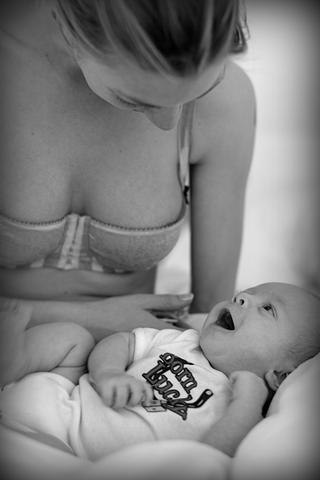Staying Comfy During Pregnancy
You have just peed on a stick, or dunked the stick in pee, and saw the little plus-sign or smiley face, or "PREGNANT" sign appear indicating that you are indeed "with child." Surely a range of emotions burst forth from within: excitement, nervousness, perhaps a sprinkle of terror for a nanosecond or two, and you take a deep breath and prepare for the next nine (or ten) months of pregnancy bliss. Only, it ain't always so blissful. While it's true that some women breeze through pregnancy with nary a sneeze, there are many more of us who suffer from some form of discomfort at one point or another. Thankfully, there are things you can do, both before you get pregnant and during, that may help to alleviate some of these uncomfortable situations. 1. Morning Sickness Obviously this is going to be the number one complaint that pregnant women have, because - let's face it - who the heck likes to be nauseous and possibly vomiting daily for three or four (or more) months? Certainly not me! This does not have to be part of your pregnancy, however, and depending on how willing you are to ensure that this does not happen may play a large role in whether or not you manage to escape it. First, let's remember that a little more than half of all women will experience some form of morning sickness during pregnancy. These are pretty balanced odds (hehe) that actually made me feel better about the chances of experiencing it, as opposed to if the statistics were more like 90%. Some things you can do before you ever even get pregnant (if you have made the decision to try to become pregnant) are to start getting yourself as healthy as possible. This means consuming lots of rich mineral broths, plenty of green, leafy vegetables (preferably organic, but do the best you can), pasture-raised meats, and dairy from grass-fed cows (or goats or sheep). Look into high-quality supplements that will boost your Vitamins A, D, and K-2 such as fermented cod liver oil and high vitamin butter oil (I use this brand: http://codliveroilshop.com/). And probably one of the most important supplements to take before you get pregnant is Magnesium. Magnesium is a natural relaxant and is a critical nutrient that many of us are deficient in. Eating sea vegetables or nettles, and taking Magnesium supplements are the best ways to boost your levels. You can buy Magnesium drinks, use mag oil transdermally, or take concentrated trace mineral drops, all of which will help to decrease your chances of experiencing morning sickness. Even if you are already pregnant, doing the aforementioned nutritional boosts can still help to lessen or eliminate morning sickness, though it may be more difficult to do since your body is already using up your nutrient stores to feed your growing baby. Additional suggestions for combating morning sickness is to eat plenty of protein throughout the day, especially before bed, and first thing in the morning. If you are having a hard time keeping anything down, making sure to hydrate and nourish yourself with bone broths, soups, and fresh juices (especially with ginger added) can be very healing and comforting. 2. Sore Breasts Hormonal shifts which raise estrogen and progesterone levels cause breasts to enlarge, and increase blood flow to the breast tissues. Because of this, your breasts may become sore, swollen, and sensitive to touch. Thankfully, you can try a few things to make things a bit more comfortable for you. Wear a soft, supportive bra. Reducing breast movement during times of soreness will greatly reduce discomfort. Sports bras are a wonderful option for those who do not like underwires, and can even be worn at night. Make sure that your bras are the proper fit, otherwise they make things worse. If need be, visit your local lingerie shop for a professional fitting. Taking a warm bath or shower is another way to pamper yourself while alleviating some of the discomfort of sore breasts. Water can be highly therapeutic, especially when you make it a relaxing experience. Soften the lighting, light an aromatherapy candle or add a few drops of your favorite essential oil and allow yourself to luxuriate for a few moments before stepping back into reality. You can also use coconut or olive oil to do a breast massage. This may or may not be helpful depending on how sensitive your are to touch, but if you are able to it can provide some much-needed relief. 3. Fatigue We're not talking "Oh, I feel a bit tired today." We're talking about head-bobbing, slumped over your shopping cart at the grocery store exhausted. It takes a LOT of energy to create another human being, and it can be very difficult to feel peppy and spritely when it seems that all of your zest has been drained into a pool of oblivion. If you are suffering from morning sickness or an iron-deficiency, and/or are anxious and stressed, fatigue is almost inevitable. To combat this as much as possible, make sure you get adequate rest. I know, I know. You may be thinking "Duh," but for women who are working full-time, or have other children to take care of during the day, taking a nap when you feel you really need it can be almost impossible. Go to bed early at night, and if you get an opportunity to take a nap during the day, take it! Drinking plenty of fluids, eating healthful foods, and getting some daily exercise will all help to keep your energy levels up. While you may still be tired for the first trimester or two (or three), doing the above should at least assist in increase your energy somewhat and keep you from feeling like a snail in molasses in January. 4. Frequent Urination There really isn't any escaping this one. As your uterus grows, the bladder begins to get a little crowded and you will likely find yourself visiting the Ladies Room a bit more (or a LOT more) than you normally would. During the day, it is necessary to stay hydrated for all of the above reasons (plus, it's just good for you!) so you probably won't be able to control how often you have to pee. If it keeps you awake at night, however, you may want to cut back on your intake of fluids a few hours before bed so that you won't hear the toilet beckoning to you. And if worse comes to worse, you can always buy one of our Pregnancy-sized FuzziBunz Cloth diapers so you don't have to get up so much! That last part was a joke. But don't-cha think it would be kind of handy?? ...Anyone? 5. Cravings and Food Aversions I'm a total foodie, and there weren't really too many foods that caused my stomach to turn when I was pregnant, but one night a friend of mine was making soup of some sort in the crockpot and I could smell it through the walls of my bedroom (where I tend to hibernate when feeling less than stellar), and I wished I had a fan that would blow the smell out of the bedroom because it was literally making me feel ill. A vast majority of pregnant women will experience food aversions, and it's important that you allow yourself some leeway when it comes to when, what, and how you eat. You may be fine with red meat one day and the next you want to throw it out the window. That's fine! Eat it on the days when you want it, and find something else on the days when you don't. It IS important to get protein into your body while your pregnant, and this is the challenge for many women because for some reason protein seems to cause the most sour faces in pregnancy. Try to find times each day when you can be OK with protein, whether it is in the form of meat, eggs, or raw dairy. On the opposite side of things are food cravings. You've all heard the pregnant woman (and apparently there are like, 2 million of them) who craved ice cream and pickles - together - throughout her pregnancy. Well, maybe some women do crave pickles and ice cream. Or maybe you crave a giant meat-ball sub, toasted golden and oozing with mozzarella cheese (this was my craving, and nobody ever got me one!)... or perhaps yours was grapefruit juice with chocolate chip cookies. Whatever your cravings are, it is important to realize that sometimes these cravings are a sign that your body needs a particular nutrient, vitamin, or mineral. It is also important to realize that the protein that you might get from a McDonald's cheeseburger is not the same as the protein you'll get from a homemade grassfed burger. And getting a little sugar from a Butterfinger (oh man I used to love those) is not the same as some whole fat yogurt with a dollop of raw honey. Allow yourself the occasional indulgence when you crave something wicked, but keep the majority of your food intake healthful. After all, you are eating for two! What was your pregnancy experience like? Did you suffer from any of the above? And please... tell me about your food cravings (I love hearing about those).



